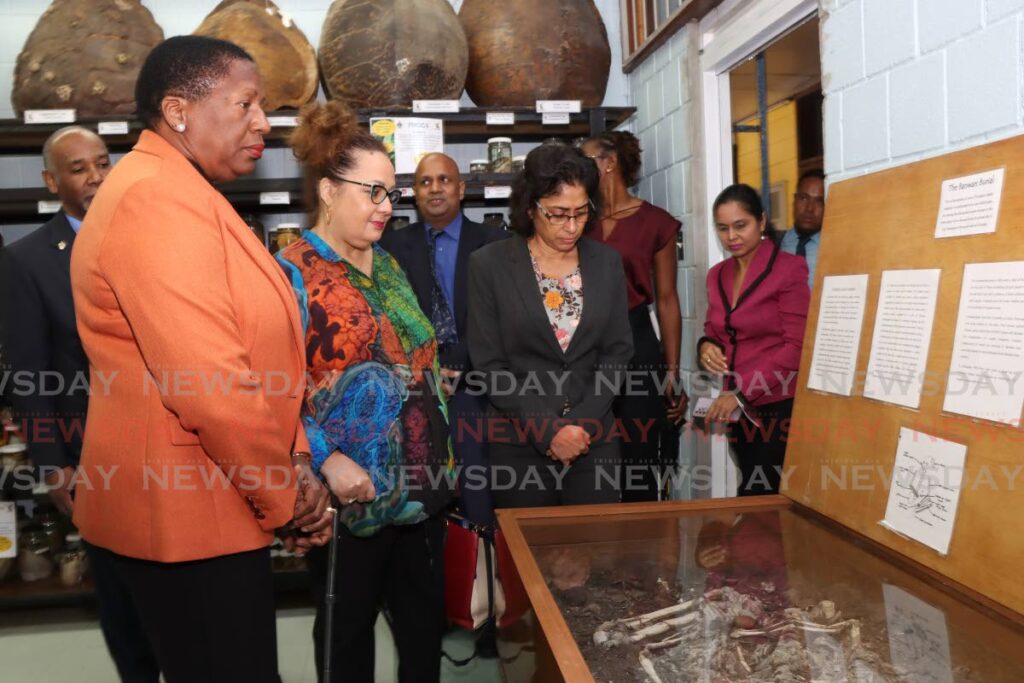Planning Minister commends UWI, UNDP pollinator garden

Planning and Development Minister Pennelope Beckles-Robinson is optimistic that the launch of a pollinator garden programme will go a long way towards building environmental resilience while enhancing food security.
Beckles-Robinson made the remarks at the launch of a pollinator garden at the UWI Life Sciences Department, St Augustine, on Friday, as she praised the staff and their team for researching and organising the programme.
The garden aims to support and maintain pollinators like insects and birds by attracting them with pollen and nectar. This ensures the creatures remain in the area to help with pollination for food production.
The Biodiversity and Ecosystem Services Network (BES-Net) is expected to work closely with UWI in offering guidance on the necessary elements of a primary pollinator garden.
Beckles-Robinson said the launch of the garden was the first step towards protecting ecosystems by enriching natural processes.
Referring to a 2019 study by the University of Sydney, Australia, which reported that global insect populations were being reduced at an annual rate of 2.5 per cent, Beckles-Robinson said such data was troubling, as pollinators played a crucial role in food security.
Despite this, she said, government and academia were committed to addressing these concerns, and she was confident such a programme would make a difference in mitigating the loss of pollinators.
“The establishment of a pollinator garden represents a space where research may be conducted to map the interaction between pollinator species and flowering plants, enabling us to better understand which plants engender pollinator populations, as well as the mechanisms by which this occurs, and to provide an opportunity to comprehensively catalogue our various taxa of pollinators.
“Such knowledge helps amplify efforts in reforestation and agriculture to bring about positive ecological change and improve food production both in terms of quality and volume. TT has a well founded reputation for the production of world-class honey and cocoa, and this is due in no small part to the output of our pollinators.
“To address this, we must protect and enhance our forested areas, seek to restore or rehabilitate degraded lands, and, in urbanised settlements, create green spaces to act as refuges for pollinators.”
Taking small steps such as establishing pollinator gardens, she said, created “a feeder system which may reinforce our larger natural areas, building resilience in the process.
“Simple and small-scale initiatives add up over time and not only help change our environment for the better, but also have the effect of changing mindsets and behaviours.”
She said the launch of the garden was in keeping with TT’s commitment to the environment, especially as this country was a signatory to the UN Convention to Combat Desertification.

Beckles-Robinson said outside the obvious ecological benefits of protecting pollinators, there was also an aesthetic appeal to creating pollinator gardens, as they would include colourful plants and flowers.
“Pollinators beautify our environment by facilitating the expression of a universally accepted aesthetic, which is that of flowering plants.
“The action of pollinators not only makes our environment more hospitable to us, but subconsciously enriches our lives and speaks to the intangible things we all value the most.”
Campus principal Prof Rose-Marie Antoine also praised the technical work of staff in the Life Sciences Department, saying academia was active in addressing matters of national concern, specifically food security.
In fact, she said, “We are cutting-edge, despite the fact that we have very limited resources.
“In most countries of the world there are huge budgets spent on funding research. We don’t have that luxury, but at the UWI we are front and foremost and I dare say this Faculty of Science and Technology is one of the gems.
‘’Some of the products that we’ve been creating in our labs like plastic sealants, roofing compounds, this faculty does tremendous work.’’
Acting head of the Life Sciences Department Dr Azad Mohammed said the benefits of the project were twofold, as it offered protection to pollinators and also brought science to the community by making people stakeholders in the pollination garden.
Mohammed said raising awareness through information campaigns and community engagement was crucial.
“This is to help people in the communities understand what we do and the importance of what we do, not only for us to get more funding, but in order for them to understand why we do it, to benefit them.
‘’The BES-Net project, with its pollinator garden, is going to do exactly the same thing: bring people to these areas where they can focus on these pollinators and get an understanding of these pollinators in the environment and (with respect) to their own livelihoods, especially in agriculture.”
The programme involves the Ministry of Planning and Development, UWI and the UN Development Programme.

Comments
"Planning Minister commends UWI, UNDP pollinator garden"